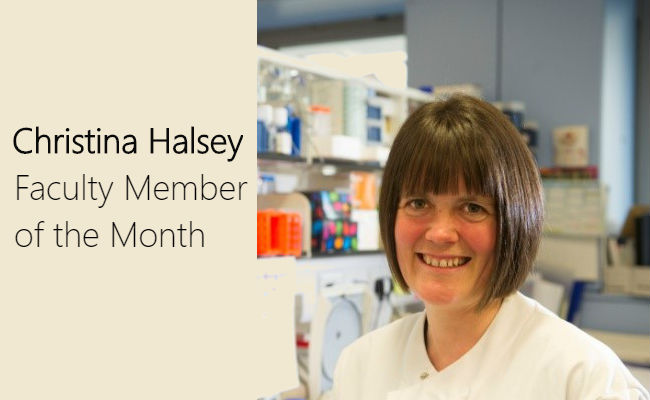“Work hard and keep focused on your ultimate goal, but don’t feel you have to sacrifice everything else for your career.”
| 8 March, 2017 | Shane Canning |
|

|

Christina Halsey is March’s featured Faculty Member of the Month, we are posting a bit earlier in the month than usual to coincide with International Women’s Day. Christina has been Section Head for Pediatric Hematology in the Hematology Faculty since December 2015. Section Heads are leading experts in their field and are responsible for dividing their Section into topics and selecting suitable Faculty Members who will review the literature in each of the topic areas.
Dr Christina Halsey is a Senior Clinical Lecturer and an Honorary NHS Consultant Paediatric Haematologist. She carries out her NHS clinical duties at the Royal Hospital for Children, Glasgow, where she cares for children with a wide range of malignant and non-malignant blood disorders. Her research lab is based in the Institute of Cancer Sciences, University of Glasgow where she investigates mechanisms of central nervous system disease in childhood acute lymphoblastic leukaemia (ALL) and ways to reduce treatment related toxicity in this condition. Dr Halsey is one of the organisers of Childhood Leukaemia Research UK meetings, is an active member of the International BFM (iBFM) Childhood Leukaemia Study Group and is Chair of the Methotrexate Stroke Like Syndrome and seizures working parties in the Ponte di Legno/iBFM Toxicity Working Group.
Can you tell us a little bit about your work?
I head up an excellent team of researchers working on devising more effective and less toxic management strategies for central nervous system (CNS) infiltration in childhood acute lymphoblastic leukaemia. CNS leukaemia remains a real clinical challenge with little known about the factors that determine CNS relapse or how best to develop risk-adapted CNS-directed therapy. Our laboratory works on many aspects of this problem; from investigating why some children suffer significant neurotoxicity from CNS directed treatment, right down to studying the behaviour of leukaemic cells in the CNS compared to the bone marrow environment. We are also working on developing new diagnostic tests for CNS leukaemia and therapies that might hit the “Achilles heel” of leukaemic cells within the CNS compartment. I am also privileged to work with an amazing group of dedicated pediatric haematologists around the world who have banded together to investigate rare CNS toxicities such as Methotrexate Stroke Like Syndrome and Posterior Reversible Encephalopathy syndrome. We are just about to start a deep phenotype-genotype association study with cases contributed by 16 different clinical trials groups across the globe as part of the Ponte di Legno/iBFM Toxicity Working Group initiative.
What was one of last recommendation and why did you pick it?
As section head of the Pediatric Hematology section I get to read all the insightful reviews and critiques from the Faculty members. I find this an incredibly useful way of keeping up with recent developments in all areas of pediatric hematology both malignant and non-malignant. I have recently commissioned an article on toxicities during ALL therapy written by Kjeld Schmiegelow and Thomas Frandsen, this is a superb distillation of all the recent advances in this area and will be appearing on F1000 reviews very soon – watch out for it!
What do you like about working on F1000Prime?
Working with a great team of clinicians and researchers who go the extra mile to post really useful comments and critiques on the most important advances in the field. I also love the general articles on science ethics, statistical flaws and other big issues for all research active clinicians and basic scientists.
Today is International Women’s Day, what advice would you give to women who are thinking about pursuing a career in STEM based on what you have experienced during your career?
Work hard and keep focused on your ultimate goal, but don’t feel you have to sacrifice everything else for your career. Time spent working part-time, raising a family or other obligations, can give you valuable skills in resilience, negotiation, collaboration and communication, all of which are so vital to long-term scientific success! It is possible to juggle the two as long as you accept you can’t be perfect at everything all the time and focus on your priority areas.

|


User comments must be in English, comprehensible and relevant to the post under discussion. We reserve the right to remove any comments that we consider to be inappropriate, offensive or otherwise in breach of the User Comment Terms and Conditions. Commenters must not use a comment for personal attacks.
Click here to post comment and indicate that you accept the Commenting Terms and Conditions.